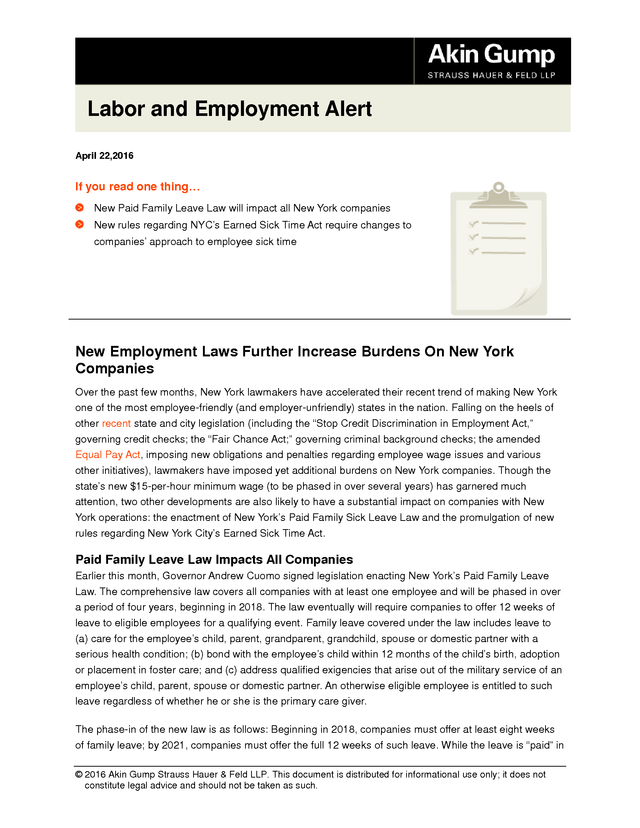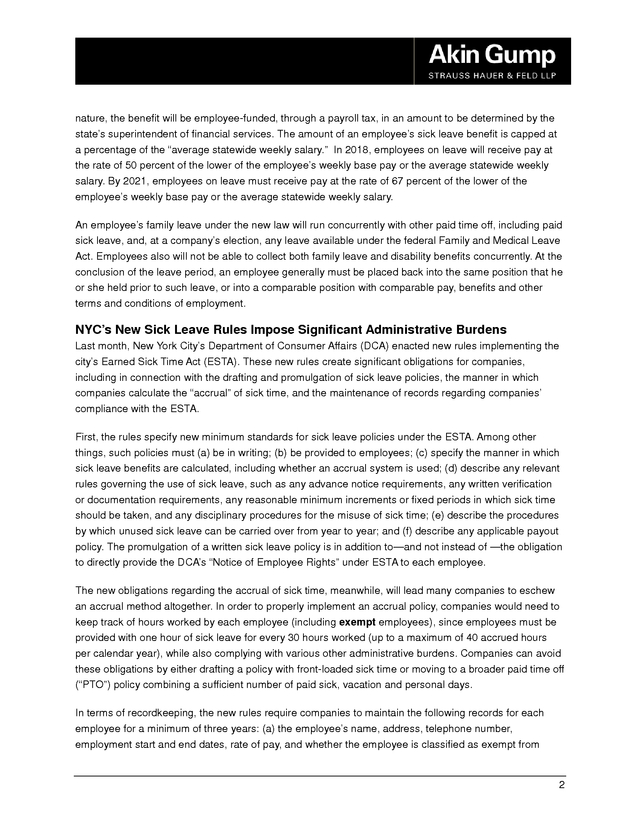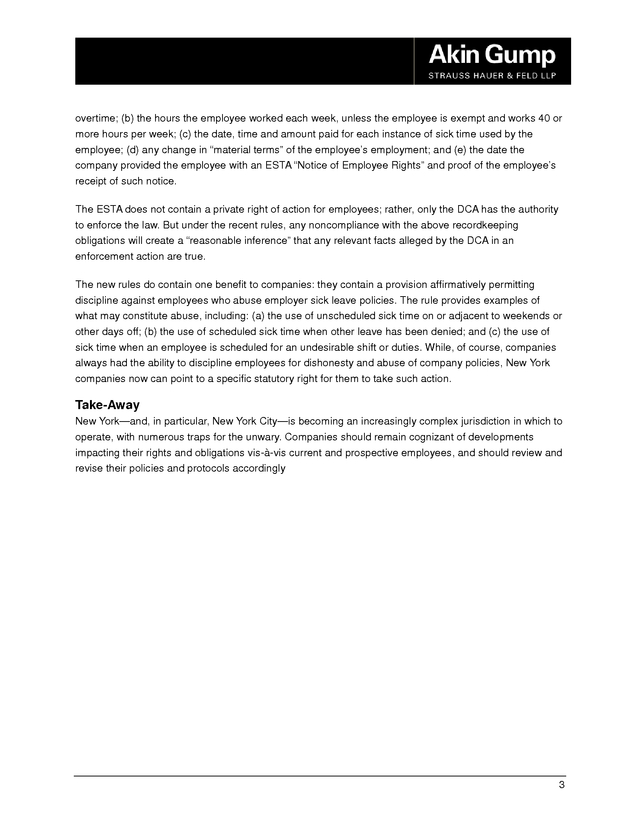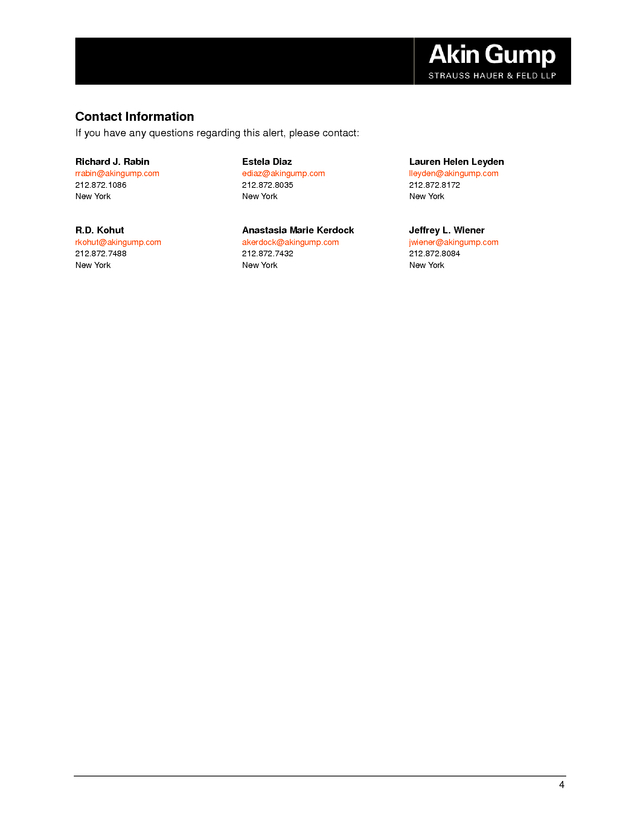New Employment Laws Further Increase Burdens on New York Companies – April 22, 2016
Akin Gump Strauss Hauer & Feld
Description
Labor and Employment Alert
April 22,2016
If you read one thing…
New Paid Family Leave Law will impact all New York companies
New rules regarding NYC’s Earned Sick Time Act require changes to
companies’ approach to employee sick time
New Employment Laws Further Increase Burdens On New York
Companies
Over the past few months, New York lawmakers have accelerated their recent trend of making New York
one of the most employee-friendly (and employer-unfriendly) states in the nation. Falling on the heels of
other recent state and city legislation (including the “Stop Credit Discrimination in Employment Act,”
governing credit checks; the “Fair Chance Act;” governing criminal background checks; the amended
Equal Pay Act, imposing new obligations and penalties regarding employee wage issues and various
other initiatives), lawmakers have imposed yet additional burdens on New York companies. Though the
state’s new $15-per-hour minimum wage (to be phased in over several years) has garnered much
attention, two other developments are also likely to have a substantial impact on companies with New
York operations: the enactment of New York’s Paid Family Sick Leave Law and the promulgation of new
rules regarding New York City’s Earned Sick Time Act.
Paid Family Leave Law Impacts All Companies
Earlier this month, Governor Andrew Cuomo signed legislation enacting New York’s Paid Family Leave
Law. The comprehensive law covers all companies with at least one employee and will be phased in over
a period of four years, beginning in 2018.
The law eventually will require companies to offer 12 weeks of leave to eligible employees for a qualifying event. Family leave covered under the law includes leave to (a) care for the employee’s child, parent, grandparent, grandchild, spouse or domestic partner with a serious health condition; (b) bond with the employee’s child within 12 months of the child’s birth, adoption or placement in foster care; and (c) address qualified exigencies that arise out of the military service of an employee’s child, parent, spouse or domestic partner. An otherwise eligible employee is entitled to such leave regardless of whether he or she is the primary care giver. The phase-in of the new law is as follows: Beginning in 2018, companies must offer at least eight weeks of family leave; by 2021, companies must offer the full 12 weeks of such leave.
While the leave is “paid” in © 2016 Akin Gump Strauss Hauer & Feld LLP. This document is distributed for informational use only; it does not constitute legal advice and should not be taken as such. . nature, the benefit will be employee-funded, through a payroll tax, in an amount to be determined by the state’s superintendent of financial services. The amount of an employee’s sick leave benefit is capped at a percentage of the “average statewide weekly salary.” In 2018, employees on leave will receive pay at the rate of 50 percent of the lower of the employee’s weekly base pay or the average statewide weekly salary. By 2021, employees on leave must receive pay at the rate of 67 percent of the lower of the employee’s weekly base pay or the average statewide weekly salary. An employee’s family leave under the new law will run concurrently with other paid time off, including paid sick leave, and, at a company’s election, any leave available under the federal Family and Medical Leave Act. Employees also will not be able to collect both family leave and disability benefits concurrently.
At the conclusion of the leave period, an employee generally must be placed back into the same position that he or she held prior to such leave, or into a comparable position with comparable pay, benefits and other terms and conditions of employment. NYC’s New Sick Leave Rules Impose Significant Administrative Burdens Last month, New York City’s Department of Consumer Affairs (DCA) enacted new rules implementing the city’s Earned Sick Time Act (ESTA). These new rules create significant obligations for companies, including in connection with the drafting and promulgation of sick leave policies, the manner in which companies calculate the “accrual” of sick time, and the maintenance of records regarding companies’ compliance with the ESTA. First, the rules specify new minimum standards for sick leave policies under the ESTA. Among other things, such policies must (a) be in writing; (b) be provided to employees; (c) specify the manner in which sick leave benefits are calculated, including whether an accrual system is used; (d) describe any relevant rules governing the use of sick leave, such as any advance notice requirements, any written verification or documentation requirements, any reasonable minimum increments or fixed periods in which sick time should be taken, and any disciplinary procedures for the misuse of sick time; (e) describe the procedures by which unused sick leave can be carried over from year to year; and (f) describe any applicable payout policy.
The promulgation of a written sick leave policy is in addition to—and not instead of —the obligation to directly provide the DCA’s “Notice of Employee Rights” under ESTA to each employee. The new obligations regarding the accrual of sick time, meanwhile, will lead many companies to eschew an accrual method altogether. In order to properly implement an accrual policy, companies would need to keep track of hours worked by each employee (including exempt employees), since employees must be provided with one hour of sick leave for every 30 hours worked (up to a maximum of 40 accrued hours per calendar year), while also complying with various other administrative burdens. Companies can avoid these obligations by either drafting a policy with front-loaded sick time or moving to a broader paid time off (“PTO”) policy combining a sufficient number of paid sick, vacation and personal days. In terms of recordkeeping, the new rules require companies to maintain the following records for each employee for a minimum of three years: (a) the employee’s name, address, telephone number, employment start and end dates, rate of pay, and whether the employee is classified as exempt from 2 .
overtime; (b) the hours the employee worked each week, unless the employee is exempt and works 40 or more hours per week; (c) the date, time and amount paid for each instance of sick time used by the employee; (d) any change in “material terms” of the employee’s employment; and (e) the date the company provided the employee with an ESTA “Notice of Employee Rights” and proof of the employee’s receipt of such notice. The ESTA does not contain a private right of action for employees; rather, only the DCA has the authority to enforce the law. But under the recent rules, any noncompliance with the above recordkeeping obligations will create a “reasonable inference” that any relevant facts alleged by the DCA in an enforcement action are true. The new rules do contain one benefit to companies: they contain a provision affirmatively permitting discipline against employees who abuse employer sick leave policies. The rule provides examples of what may constitute abuse, including: (a) the use of unscheduled sick time on or adjacent to weekends or other days off; (b) the use of scheduled sick time when other leave has been denied; and (c) the use of sick time when an employee is scheduled for an undesirable shift or duties. While, of course, companies always had the ability to discipline employees for dishonesty and abuse of company policies, New York companies now can point to a specific statutory right for them to take such action. Take-Away New York—and, in particular, New York City—is becoming an increasingly complex jurisdiction in which to operate, with numerous traps for the unwary.
Companies should remain cognizant of developments impacting their rights and obligations vis-à-vis current and prospective employees, and should review and revise their policies and protocols accordingly 3 . Contact Information If you have any questions regarding this alert, please contact: Richard J. Rabin Estela Diaz Lauren Helen Leyden rrabin@akingump.com 212.872.1086 New York ediaz@akingump.com 212.872.8035 New York lleyden@akingump.com 212.872.8172 New York R.D. Kohut Anastasia Marie Kerdock Jeffrey L. Wiener rkohut@akingump.com 212.872.7488 New York akerdock@akingump.com 212.872.7432 New York jwiener@akingump.com 212.872.8084 New York 4 .
The law eventually will require companies to offer 12 weeks of leave to eligible employees for a qualifying event. Family leave covered under the law includes leave to (a) care for the employee’s child, parent, grandparent, grandchild, spouse or domestic partner with a serious health condition; (b) bond with the employee’s child within 12 months of the child’s birth, adoption or placement in foster care; and (c) address qualified exigencies that arise out of the military service of an employee’s child, parent, spouse or domestic partner. An otherwise eligible employee is entitled to such leave regardless of whether he or she is the primary care giver. The phase-in of the new law is as follows: Beginning in 2018, companies must offer at least eight weeks of family leave; by 2021, companies must offer the full 12 weeks of such leave.
While the leave is “paid” in © 2016 Akin Gump Strauss Hauer & Feld LLP. This document is distributed for informational use only; it does not constitute legal advice and should not be taken as such. . nature, the benefit will be employee-funded, through a payroll tax, in an amount to be determined by the state’s superintendent of financial services. The amount of an employee’s sick leave benefit is capped at a percentage of the “average statewide weekly salary.” In 2018, employees on leave will receive pay at the rate of 50 percent of the lower of the employee’s weekly base pay or the average statewide weekly salary. By 2021, employees on leave must receive pay at the rate of 67 percent of the lower of the employee’s weekly base pay or the average statewide weekly salary. An employee’s family leave under the new law will run concurrently with other paid time off, including paid sick leave, and, at a company’s election, any leave available under the federal Family and Medical Leave Act. Employees also will not be able to collect both family leave and disability benefits concurrently.
At the conclusion of the leave period, an employee generally must be placed back into the same position that he or she held prior to such leave, or into a comparable position with comparable pay, benefits and other terms and conditions of employment. NYC’s New Sick Leave Rules Impose Significant Administrative Burdens Last month, New York City’s Department of Consumer Affairs (DCA) enacted new rules implementing the city’s Earned Sick Time Act (ESTA). These new rules create significant obligations for companies, including in connection with the drafting and promulgation of sick leave policies, the manner in which companies calculate the “accrual” of sick time, and the maintenance of records regarding companies’ compliance with the ESTA. First, the rules specify new minimum standards for sick leave policies under the ESTA. Among other things, such policies must (a) be in writing; (b) be provided to employees; (c) specify the manner in which sick leave benefits are calculated, including whether an accrual system is used; (d) describe any relevant rules governing the use of sick leave, such as any advance notice requirements, any written verification or documentation requirements, any reasonable minimum increments or fixed periods in which sick time should be taken, and any disciplinary procedures for the misuse of sick time; (e) describe the procedures by which unused sick leave can be carried over from year to year; and (f) describe any applicable payout policy.
The promulgation of a written sick leave policy is in addition to—and not instead of —the obligation to directly provide the DCA’s “Notice of Employee Rights” under ESTA to each employee. The new obligations regarding the accrual of sick time, meanwhile, will lead many companies to eschew an accrual method altogether. In order to properly implement an accrual policy, companies would need to keep track of hours worked by each employee (including exempt employees), since employees must be provided with one hour of sick leave for every 30 hours worked (up to a maximum of 40 accrued hours per calendar year), while also complying with various other administrative burdens. Companies can avoid these obligations by either drafting a policy with front-loaded sick time or moving to a broader paid time off (“PTO”) policy combining a sufficient number of paid sick, vacation and personal days. In terms of recordkeeping, the new rules require companies to maintain the following records for each employee for a minimum of three years: (a) the employee’s name, address, telephone number, employment start and end dates, rate of pay, and whether the employee is classified as exempt from 2 .
overtime; (b) the hours the employee worked each week, unless the employee is exempt and works 40 or more hours per week; (c) the date, time and amount paid for each instance of sick time used by the employee; (d) any change in “material terms” of the employee’s employment; and (e) the date the company provided the employee with an ESTA “Notice of Employee Rights” and proof of the employee’s receipt of such notice. The ESTA does not contain a private right of action for employees; rather, only the DCA has the authority to enforce the law. But under the recent rules, any noncompliance with the above recordkeeping obligations will create a “reasonable inference” that any relevant facts alleged by the DCA in an enforcement action are true. The new rules do contain one benefit to companies: they contain a provision affirmatively permitting discipline against employees who abuse employer sick leave policies. The rule provides examples of what may constitute abuse, including: (a) the use of unscheduled sick time on or adjacent to weekends or other days off; (b) the use of scheduled sick time when other leave has been denied; and (c) the use of sick time when an employee is scheduled for an undesirable shift or duties. While, of course, companies always had the ability to discipline employees for dishonesty and abuse of company policies, New York companies now can point to a specific statutory right for them to take such action. Take-Away New York—and, in particular, New York City—is becoming an increasingly complex jurisdiction in which to operate, with numerous traps for the unwary.
Companies should remain cognizant of developments impacting their rights and obligations vis-à-vis current and prospective employees, and should review and revise their policies and protocols accordingly 3 . Contact Information If you have any questions regarding this alert, please contact: Richard J. Rabin Estela Diaz Lauren Helen Leyden rrabin@akingump.com 212.872.1086 New York ediaz@akingump.com 212.872.8035 New York lleyden@akingump.com 212.872.8172 New York R.D. Kohut Anastasia Marie Kerdock Jeffrey L. Wiener rkohut@akingump.com 212.872.7488 New York akerdock@akingump.com 212.872.7432 New York jwiener@akingump.com 212.872.8084 New York 4 .

















